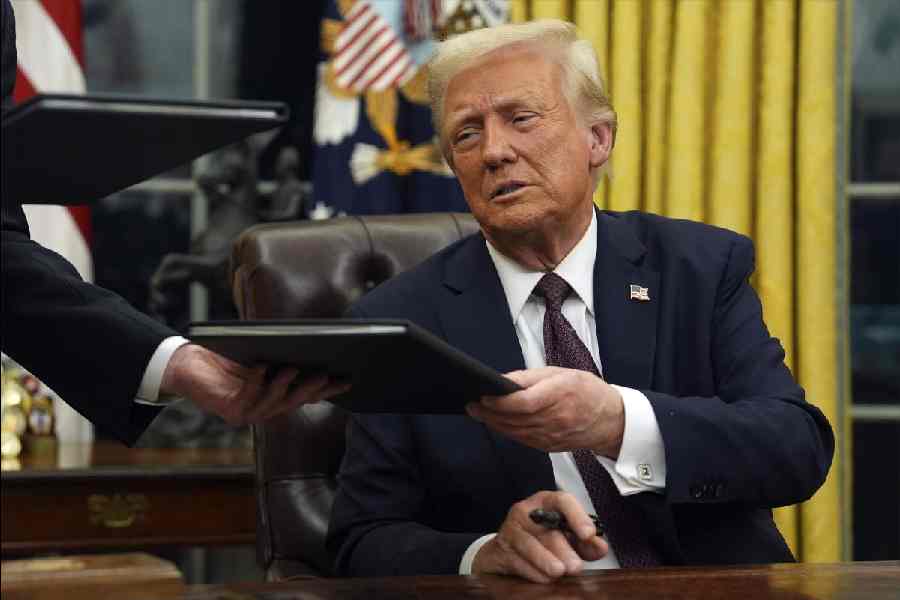President Donald Trump on Monday declared that his government would no longer treat the U.S.-born children of people who entered the country illegally as citizens, signaling his intent to essentially ignore the constitutional guarantee of birthright citizenship in a move that is all but certain to invite a legal challenge.
His order directed federal agencies not to issue citizenship documents to such children, starting in 30 days.
It flew in the face of the guarantee, rooted in common law and enshrined in the Constitution for more than 150 years, that anyone born in the United States is automatically an American citizen.
In the executive order, Trump said he would interpret the 14th Amendment differently than had been done in the past, arguing that it “has never been interpreted to extend citizenship universally to everyone born within the United States.”
The order would mean that citizenship would not be extended to a child whose mother and father are not authorized to be in the United States at the time of birth.
Trump has long said that conferring American citizenship on the children of immigrants without legal status was unacceptable to him. But because birthright citizenship is guaranteed by the 14th Amendment to the Constitution, such an order would face major legal challenges. Any change to the Constitution requires supermajority votes in Congress, and then ratification by three-quarters of the states.
Here is what you need to know.
The Constitution guarantees birthright citizenship.
The 14th Amendment, ratified in 1868, says: “All persons born or naturalized in the United States, and subject to the jurisdiction thereof, are citizens of the United States and of the state wherein they reside.”
The part about jurisdiction creates a very narrow exception that has until now essentially applied only to children of accredited foreign diplomats. Other than that, the citizenship or immigration status of a person’s parents has not been held to have any effect on this right.
Trump cannot abolish birthright citizenship by himself.
A president cannot amend the Constitution on his own, and any executive order to restrict or abolish birthright citizenship is almost certain to be challenged in court as a violation of the 14th Amendment.
But Trump is interpreting the jurisdiction language in the amendment to exclude “the children of illegal aliens born in the United States.” Until now, the overwhelming scholarly and legal consensus has been that such an interpretation would have little or no chance of prevailing in court.
Some legal scholars think such arguments will continue to be nonstarters in the courts. But the idea that the Supreme Court may at some point find arguments for restricting birthright citizenship persuasive is “no longer laughable,” said Amanda Frost, a law professor at the University of Virginia and an expert on immigration and citizenship law.
Limiting birthright citizenship was the consensus position among Republican presidential candidates in the 2024 election, and at least one federal judge has indicated a willingness to consider it.
“I don’t think it’s inconceivable, which is what I would have said in 2019,” Frost said. “The ground is shifting.”
By directing federal agencies to deny the children of immigrants who are in the U.S. illegally citizenship-affirming documents like Social Security cards and passports, the Trump administration is effectively ordering them to be cutting them off from government services like public schools, health care, nutrition and housing benefits. The policy — acting as if the 14th Amendment did not apply to those people — is very likely to draw a legal challenge as well.
Other countries have birthright citizenship.
Thirty-three countries and two territories — nearly all in the Western Hemisphere, including Mexico and Canada — have unrestricted birthright citizenship similar to that of the United States, according to a tally by the World Population Review.
Another 40 have restricted versions of the right. It may apply, for example, only to children of legal residents or of parents born in the country. Or it may exclude refugees.
Several countries that, like the United States, had traditions of universal birthright citizenship rooted in English common law — including Britain, Ireland, Australia, New Zealand and India — have restricted or abolished the right in recent decades.
Critics of birthright citizenship say it encourages migration.
Each year, thousands of pregnant women from other countries enter the United States on a valid visa, give birth to children who automatically gain American citizenship, and then take the babies back home or to a third country. The practice, sometimes called “birth tourism,” is legal as long as the mother obtains her visa truthfully and complies with its terms.
Trump and his supporters, however, complain about expectant mothers who enter the country to give birth to what they derisively call “anchor babies” — children whose U.S. citizenship would give the family access to public benefits and a foothold toward legal residence.
The Migration Policy Institute estimates that, as of 2019, about 4.7 million American-born children under 18 were living with a parent who was living in the country illegally — about 7% of all children in the United States. But studies have found that a vast majority of such children did not cross the border in utero. The Pew Research Center estimated in 2022 that about 5 out of 6 U.S. children of immigrants living in the U.S. illegally were born two years or more after their parents entered the United States.
Whether reared in the United States or abroad, American children of noncitizen parents have been able, once they reach age 21, to sponsor family members for legal permanent residency, just as any other American citizen could — a practice derided by critics as “chain migration.” Sponsorship by relatives has featured prominently in the stories of tens of millions of immigrants to the United States over the past century.
(New York Times news service)











